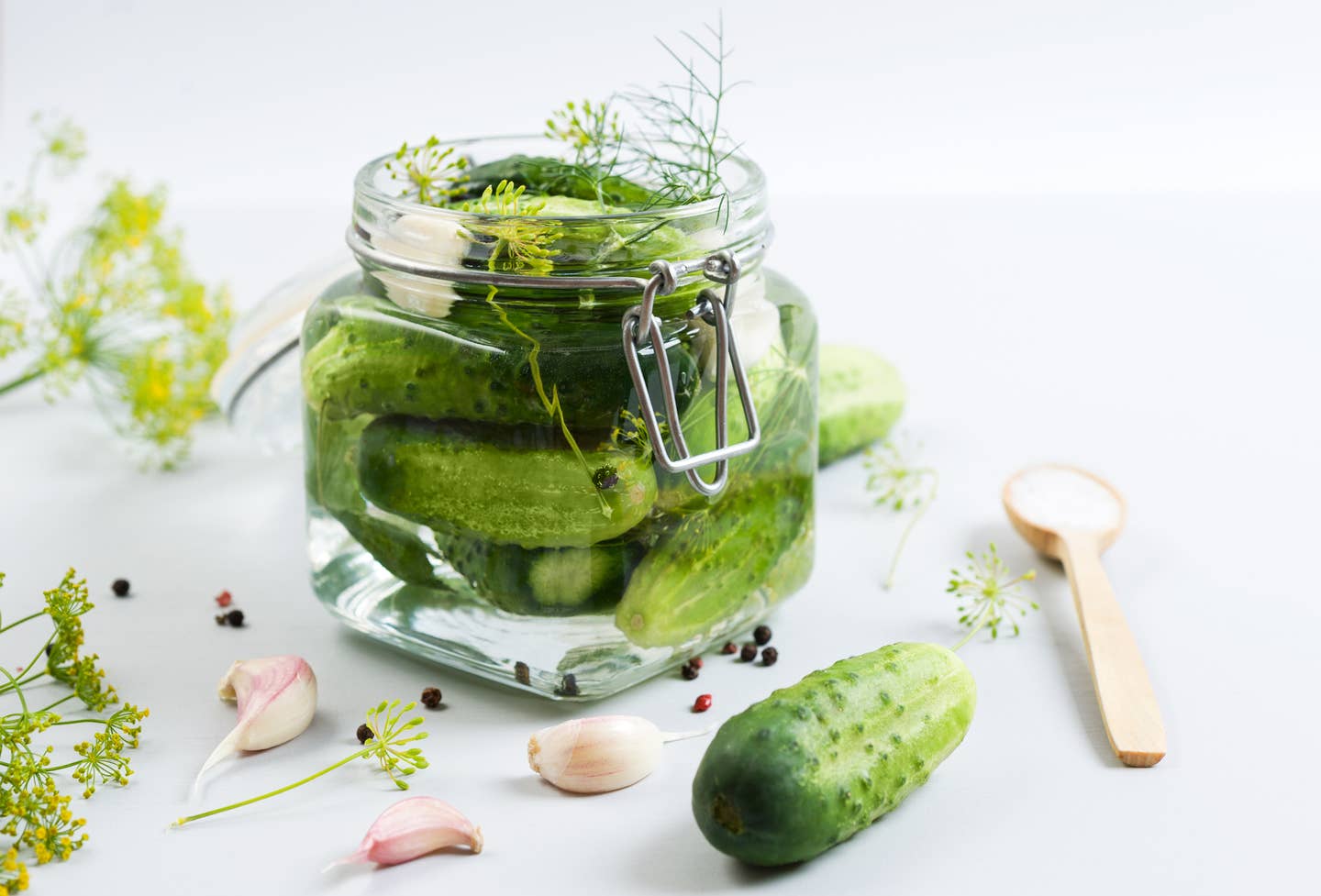
5 Health Benefits of Pickles and Why You Should Never Toss the Juice
The next time you're asked if you want a pickle with your sandwich, say "Yes!" for its health benefits. Cucumbers alone are full of antioxidants that help boost immunity, cell function, and overall health. They're low in calories and contain essential vitamins and minerals including vitamin A, vitamin K, potassium, phosphorus, and folate, which help regulate a healthy immune system. When fermented, as pickles are, the health benefits of cucumbers only get magnified. Pickles contain probiotics that help boost gut and skin health, by promoting healthy bacteria in the body, and have been linked to reduced risks of diseases including cancer, according to recent studies.
The health spotlight isn't only on the pickle, because the brine, with its natural electrolytes, may help reduce muscle cramps, according to one recent study. A combination of salt and vinegar in pickle juice can trigger your alpha motor neurons which slows the duration of muscle cramps. So before you toss the jar full of greenish-yellow liquid and seasoning, grab your water bottle and bring it to the gym. In addition, people claim pickle juice helps them feel hydrated after a long night of drinking due to its high levels of sodium.
A quick note about sodium: Dietary guidelines suggest we limit our sodium intake to 2,300 mg or less per day. One medium pickle contains around 785 mg, so while you want to reap the many health benefits of this natural whole-food snack, be sure to have no more than one or two a day.
Whatever your reason to love pickles, here are five health benefits that make pickles an even bigger 'dill.'
1. Fermented Pickles May Help Lower Risks of Cancer
Fermented foods have been linked to helping reduce inflammation in the body, and a study on the consumption of sauerkraut (fermented cabbage) pointed out that fermentation has anticarcinogenic effects. An epidemiological study also found that consumption of fermented foods that contain lactic acid bacteria, which is what gives pickles their sour tang taste, is associated with a reduced risk of breast cancer.
2. Pickles Provide Essential Nutrients
One recent study points out that pickles enhance nutrition by providing the body with vitamins and minerals. Pickles are an excellent source of Vitamin A which helps boost eye health and cell growth, and Vitamin K, shown to promote strong, healthy bones and increase healthy circulation. Pickles also contain potassium, phosphorus, and folate, which have been shown to help boost immunity and protect the body against illness.
3. Pickles May Help Fight Diseases
Cucumbers are rich in beta-carotene, an antioxidant our bodies turn into vitamin A. Antioxidants are substances that help protect the body from oxidative stress and prevent or minimize damage caused by free radicals which result in aging. Beta carotene is associated with slowing down cognitive decline and is known to boost lung health, according to a study.
4. Pickle Juice Helps Alleviate Cramps
Drinking pickle juice may help alleviate muscle cramps, specifically the duration of the cramp, according to one study. Researchers explained that pickle juice acts to inhibit the firing of alpha motor neurons of cramped muscles, which ultimately shortens the duration of the cramp and cuts down recovery time.
5. Pickle Juice Supports a Healthy Gut
Pickle juice contains large amounts of probiotic lactobacillus, a healthy gut and skin bacteria that results in healthy digestion and better skin. Results from a study showed the extract from lactobacillus was effective in repairing the skin's barriers, and reducing skin erythema (rash) and skin microflora (bacteria that cause pimples). Lactobacillus also helps the body break down food, absorb nutrients, and fight off "bad" organisms that can lead to diseases.
Bottom Line: Pickles are great for you and you should drink the brine.
Pickles, which are fermented cucumbers, contain probiotics that are great for gut health and skin health, as well as antioxidants that help boost immunity and fight off diseases. If you're wondering how to make pickles at home, follow this helpful guide.
For more great stories like this one, check out our Health & Nutrition articles.
More From The Beet






